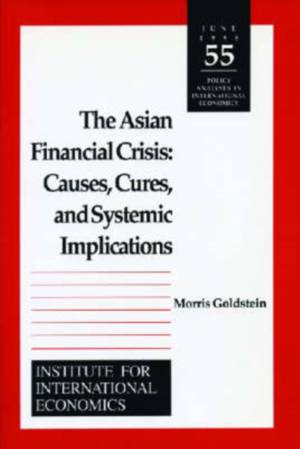
- Retrait gratuit dans votre magasin Club
- 7.000.000 titres dans notre catalogue
- Payer en toute sécurité
- Toujours un magasin près de chez vous
- Retrait gratuit dans votre magasin Club
- 7.000.0000 titres dans notre catalogue
- Payer en toute sécurité
- Toujours un magasin près de chez vous
33,95 €
+ 67 points
Description
The turmoil that rocked Asian markets after the middle of 1997 and that spread far afield was the third major currency crisis of the 1990s. Thailand, Indonesia, Malaysia, and South Korea suffered outright recessions in 1998. In an effort to contain the crisis, almost $120 billion was pledged in IMF-led official rescue packages. How could this happen to a group of countries that has been so highly regarded in the 1990's by private international capital markets? How could the crisis be overcome, and what changes are necessary to prevent it from happening again?
Morris Goldstein provides the answers to these questions by first explaining how the Asian financial crisis arose and spread. He traces the crisis through its three interrelated origins: financial sector weaknesses; external sector problems; and the contagion that spread from Thailand to other countries. Goldstein then outlines what needed to be done in the ASEAN-4 economies, in Japan and China, and in the design of IMF-led official rescue packages to end the crisis. Goldstein's final remarks offer specific proposals for improving the international financial architecture.Spécifications
Parties prenantes
- Auteur(s) :
- Editeur:
Contenu
- Nombre de pages :
- 100
- Langue:
- Anglais
- Collection :
- Tome:
- n° 55
Caractéristiques
- EAN:
- 9780881322613
- Date de parution :
- 01-06-98
- Format:
- Livre broché
- Format numérique:
- Trade paperback (VS)
- Dimensions :
- 153 mm x 229 mm
- Poids :
- 154 g

Les avis
Nous publions uniquement les avis qui respectent les conditions requises. Consultez nos conditions pour les avis.






